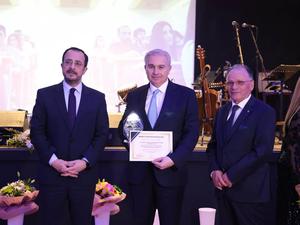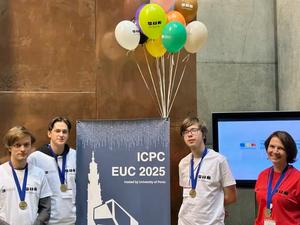Information
The Master in Financial Crime and Criminal Justice reflects the priorities of the University’s mission, is designed to provide a course of studies that meets local and national needs, promotes links with local communities and embraces modern pedagogy and learning technologies. The Master (MA) in Financial Crime and Criminal Justice will be offered by the School of Law that is dedicated to the academic excellence through teaching and research.
Specializing in a particular field is a smart choice for everyone interested in pursuing a career in that field. In that perspective the specialization in Financial Crime and Criminal Justice provides a well-designed, practice oriented, academic, post graduate education for those, on the one hand, practicing already criminal law as lawyers, prosecutors or judges, and for those, on the other, who are graduate students, aspiring to become leaders in the field of criminal law and criminal procedure in a national and European environment. During recent decades transnational Financial crime has become a major area of concern for politicians and policy makers and an increasingly important area of research. This has transformed Financial crime from a very specific area of practice, to a “day-to-day” practice, similar to civil litigation with a lot of research, drafting, factual development and argument, but with more significant client contact, which tends to be very close.
Our MA Specialization in Financial Crime and Criminal Justice intends to examine the phenomenon in terms of its recent emergence and further development, as well as to highlight typical forms and law enforcement responses to transnational organized crime. Accordingly, the aim of the program is not only to pursue an academic theoretical study, but also to enable theory to inform practice. The program is divided thematically between substantive issues of Financial crime and procedural issues within an Economic crime trial. In both cases emphasis is given on the transnational character of both the crime and the trial. Among the substantive areas which are covered are: Corporate Penal Law, Corruption – Bribery, Tax evasion, Organized crime, Money laundering, Misuse of Capital Market, Cybercrime, Fraud against the EU’s financial interests, Market Abuse, Cybercrime and Money Laundering. Participants will also learn how to deal with complex procedural matters arising in an Economic criminal trial with transnational elements, such as the principle of ne bis in idem, the rule of speciality in mutual assistance, the procedure in freezing property etc.
Program
SEMESTER 1
Compulsory
- Economic Crime with Emphasis on AML/CFT (7,5 ECTS)
Elective
- Anti-Corruption in Criminal Law (7,5 ECTS)
- Criminal Capital Market Law (7,5 ECTS)
- Economic and Financial Criminal Law: General Part (7,5 ECTS)
- The International Dimension of Corporate Responsibility (7,5 ECTS)
- Penal Protection of Professional Secrecy (7,5 ECTS)
- Introduction to the FATF Countries’ Mutual Evaluation System (7,5 ECTS)
SEMESTER 2
Compulsory
- European Economic Criminal Law (7,5 ECTS)
Elective
- Organized Crime: Substantial, Procedural, and International Law (7,5 ECTS)
- Prosecution and Investigation of Economic Crimes with Emphasis on Asset Freezing and Confiscation (7,5 ECTS)
- Corporate Criminal Law and Compliance (7,5 ECTS)
- Cybercrimes and Cybersecurity (7,5 ECTS)
- Global Taxation Standards and Financial Crime (7,5 ECTS)
- European Banking Law (7,5 ECTS)
SEMESTER 3
- Dissertation (30 ECTS)
The duration of the studies is three semesters. Postgraduate Program Enrolments for the Postgraduate Program are held in September and February / March of each academic year. Each course lasts an academic semester. All students enrolled in the Postgraduate Program either in the winter semester or the spring semester can choose from the courses offered in the relevant semesters.
For successfully completing their studies, students need to accumulate a total of 90 Credits (ECTS).
In accordance with the relevant announcements made by the Agency of Quality Assurance and Accreditation in Higher Education, students have the opportunity to complete their postgraduate studies in two academic semesters as long as they start the conduction of their Master’s Dissertation during the first or second semester of their studies, including the summer period. In this case, the completion of the Master’s Dissertation may be prolonged during the summer period, for one or two months. In any case, the total ECTS remain 90. Furthermore, a more flexible part-time route is offered. Students have the opportunity to complete their postgraduate studies in maximum three (3) years. Students will have to complete minimum 15 ECTS per semester. During the first semester the students attend four courses, one compulsory and three elective from the total offered. In the second semester, students also attend four courses, one compulsory and three elective, from the total offered. Each of the courses (compulsory and elective) is equivalent to 7.5 Credits (ECTS). During the academic year, for each of the courses (compulsory and electives), 13 lectures are held for three hours each with the instructor of each course, who is responsible for informing, guiding, advising and evaluating the students In order to obtain their Master’s degree, students are also obliged to conduct a master’s dissertation. . The research proposal is submitted by the student, who may propose as a supervisor one of the lecturers. The dissertation can be submitted for up to one academic year after the successful completion of the second semester of study. The dissertation must be relevant to the content of the postgraduate student’s studies, be original, be based on research or full use of the published sources and exhaustive study of the relevant international literature and concluding with convincing conclusions. The extent of the dissertation cannot be less than 10,000 words and more than 15,000 words. The conclusions, the bibliography and the abstract are included.
News

Neapolis University Pafos Awarded for Higher …

Neapolis University Pafos Establishes Jean Monnet …

Neapolis University Pafos and TechIsland renew …










